When the sun appeared out of the rosy dawn over the wooded islands, Tarashkin flexed his muscles and set out to tidy up the boathouse yard. It had just turned five when the wicket-gate opened and Vasily Vitalyevich Shelga appeared wheeling his bicycle down the damp path.
Shelga was a well-trained athlete, muscular and light, of average height, with a strong neck, swift, calm and cautious. He served in the C.I.D. and rowing was part of his general training.
"Hallo, Tarashkin. How's things? Everything all right?" he asked, leaning his bicycle against the porch. "I've come to give you a hand... There's an awful lot of rubbish here."
He pulled off his uniform blouse, rolled up the sleeves on wiry, muscular arms and set about clearing up the wood chips and other rubbish left over from the repair of the landing-stage.
"The fellows from the factory are coming today, we'll fix things in one evening," said Tarashkin. "By the way, are you going to put your name down for the sixer team?"
"I really don't know," answered Shelga, rolling a barrel of tar. "On the one hand I'd like to help beat the Muscovites but on the other hand I'm afraid I shan't be attending training very punctually. There's a funny sort of a job cropped up."
"What is it, gangsters again?"
"Look a bit higher. Crime on an international scale."
"That's a pity. You'd have had a good time with us."
Shelga went out on to the landing-stage, watched for a moment the patches of sunlight dancing on the water, knocked on the boom with his broom handle and called to Tarashkin in a low voice:
"Do you know all the people who live in the summer bungalows around here?"
"There are a few who live here all the winter."
"Did anybody come to one of them in the middle of March?"
Tarashkin squinted at the sunny river and with the toes of one foot scratched the other.
"There's a boarded-up cottage in that grove over there," he said. "About four weeks ago I remember seeing smoke coming from the chimney. We thought at the time that either some homeless kids or some bandit gang had got in there."
"Have you seen anybody from that house?"
"Just a minute, Vasily Vitalyevich. Why, I must have seen them today."
Tarashkin told him then about the two men whose boat had visited the swampy river-bank at dawn.
Shelga kept nodding and muttering, "Yes, yes," and his sharp eyes narrowed to tiny slits.
"Come and show me that house," he said, touching the revolver holster that hung at his side.
The house hidden amongst the stunted birch-trees seemed uninhabited—the wooden porch had rotted and the windows were fastened with boards nailed across the shutters. The attic windows were broken, the walls were moss-grown below the remnants of the gutter spouts and under the windows there was a growth of goosefoot.
"You're right. There's somebody living there," said Shelga, examining the house from the cover of the trees. Then he walked cautiously round the house. "Somebody has been here today... But why the hell did they have to climb in through the window? Tarashkin, come here, something looks fishy here."
He ran over to the porch; here there were footprints.
To the left of the porch a shutter hung down, one of its hinges freshly broken. The window had been opened inwards. There were more footprints in the damp sand under the window, big marks made, apparently, by a heavy man, and others, small and narrow, with the toes turned inwards.
"The footprints on the porch were made by different boots," said Shelga.
He looked in at the window, whistled softly and called out, "Hi, you in there, your window's open, something may be stolen." There was no answer. An unpleasant, sweetish odour drifted out of the half-dark room.
Shelga called again in a louder voice, climbed on to the window-sill, drew his revolver, and jumped lightly into the room. Tarashkin jumped in after him.
The first room was empty, the floor littered with broken brick, plaster, and scraps of newspaper. A half-open door led to the kitchen. On the kitchen stove, under a rusty cowl, on tables and stools stood a number of primus-stoves, porcelain crucibles, glass and metal retorts, jars and zinc boxes. One of the primus-stoves was still hissing as the last of the kerosene burned out.
Shelga again shouted, "Hi, mister!" He shook his head and cautiously opened the door leading into a room whose semi-darkness was cut by narrow strips of bright sunlight penetrating through cracks in the shutters.
"Here he is," said Shelga.
At the other end of the room a fully-dressed man lay on his back on an iron bed. His arms were pulled over his head and tied by the wrists to the bed rails. His legs were bound with a rope. His jacket and shirt were torn across the breast. The head was thrown back in an unnatural pose, the pointed beard sticking up.
"So that's what they did to him," said Shelga examining the dagger that had been driven in to the hilt under the left nipple. "They tortured him... Look at this-..."
"Vasily Vitalyevich, that's the man that came in the boat. It can't be more than an hour and a half since they killed him."
"You stay here on guard, don't touch anything and don't let anybody in, d'you get that, Tarashkin?"
A few minutes later Shelga was speaking from the club telephone.
"Send men to the station... Check up on all passengers... Send others to all the hotels and check up on everybody who returned between six and eight this morning. And send a man with a dog to me."
While he was waiting for the police-dog to arrive Shelga made a careful examination of the cottage, beginning with the attic.
The whole place was littered with rubbish, broken glass, scraps of wall-paper, and rusty tins. The windows were covered with cobwebs, in the corners there were mildew and toadstools. Apparently, the cottage had not been inhabited since 1918. Only the kitchen and the room with the iron bedstead showed signs of habitation. There was not even a suggestion of any sort of comfort and no remains of food with the exception of a roll and a piece of breakfast sausage in the pocket of the murdered man.
People did not live here, they came to the house in order to do something that had to be kept secret. This was the first conclusion that Shelga came to after his inspection of the building. The state of the kitchen showed that somebody had been working here with chemicals. An examination of the piles of ashes on the stove under the cowl and of some booklets with turned up corners revealed that the dead man had been engaged in nothing more serious than ordinary pyrotechnics.
Such a conclusion brought Shelga to a dead end. He made another search of the dead man's clothing but found nothing new. Then he approached the problem from another angle.
The footprints under the window showed that there had been two murderers, that they had entered through the window at the almost certain risk of meeting with resistance since the man inside could not help hearing the noise made by their breaking open the shutters.
This could only mean that the murderers were determined either to obtain something important at all costs or kill the man in the house.
Further: if they had merely wanted to kill him they could have done it much more easily, by waylaying him on his way to the house, for example; secondly, the position of the body on the bed showed that he had been tortured before he had been stabbed. The murderers had been trying to find out something that the dead man had refused to tell them.
What could they have been trying to get out of him by torture? Money? It was hardly likely that a man who went to an abandoned house at night to indulge in exercises in pyrotechnics would have taken a large sum of money with him. It was more probable that the murderers wanted him to reveal some secret connected with his nocturnal work.
Читать дальше
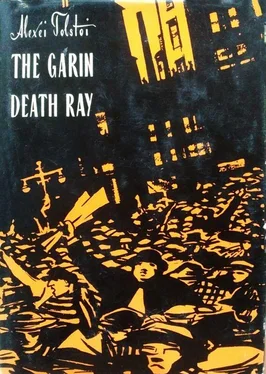
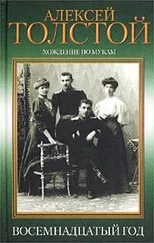

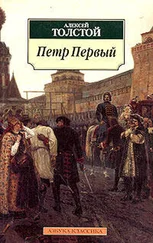
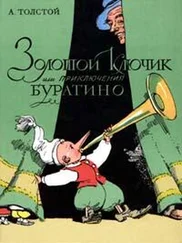
![Алексей Николаевич Толстой - Хождение по мукам [litres]](/books/26263/aleksej-nikolaevich-tolstoj-hozhdenie-po-mukam-litr-thumb.webp)
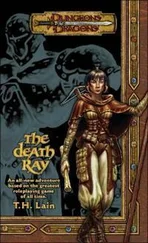

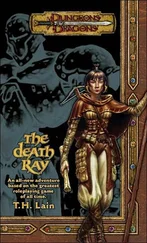


![Алексей Николаевич Толстой - Гиперболоид инженера Гарина. Аэлита [Художник Г. Зубковский]](/books/423486/aleksej-nikolaevich-tolstoj-giperboloid-inzhenera-ga-thumb.webp)
